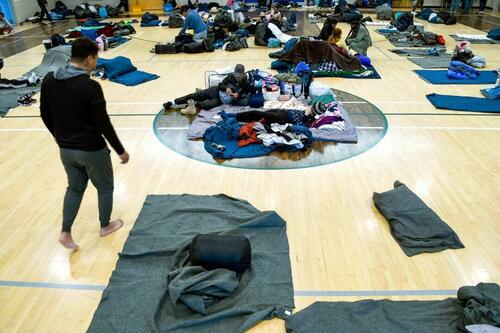Denver Cuts Taxpayer Services, Diverts $90 Million To Support Illegal Immigrants
Authored by Jana J. Pruet via The Epoch Times (emphasis ours),
Denver Mayor Mike Johnston announced a major shift Wednesday in the city’s response to the illegal immigrant crisis, extending support to six months but with only about 1,000 spaces.
The city’s nearly $90 million budget plan identifies how it will fund immigrant housing and aid for the remainder of 2024. The mayor’s pivot comes after the city failed to get federal aid. Denver has served more than 40,000 immigrants since late 2022, according to a press release.
“After more than a year of facing this crisis together, Denver finally has a sustainable plan for treating our newcomers with dignity while avoiding the worst cuts to city services,” Mr. Johnston said in a statement. “So many times, we were told that we couldn’t be compassionate while still being fiscally responsible. Today is proof that our hardest challenges are still solvable and that together, we are the ones who will solve them.”
Denver and other Democratic-led cities had asked the Biden administration for aid to assist with the influx of migrants into their communities.
President Joe Biden asked Congress for $1.4 billion in funding for the effort as part of his budget. Congress refused and instead cut the Federal Emergency Management Agency’s Shelter and Services Program from $800 million to $650 million.
“Whether we’d like the federal government to do it or not, that was no longer a choice for us,” Mr. Johnston said.
City officials claim the new approach will allow for surges of immigrants while focusing on helping them become independent. The move is a departure from the city’s previous strategy of weeks- to months-long shelter stays.
The illegal immigrant will be housed in apartments for up to six months. They will also receive job and skill training, opportunities for skills certifications, unpaid job experience, food assistance, and help with filing asylum applications.
The “Denver Asylum Seeker Program” will act as a buffer and offer intensive preparation while immigrants wait six months for their work permits after applying for asylum.
“In Denver, we believe that the way to solve these problems is not by turning our back on our American values, but by turning to our American values,” Mr. Johnston said.
Earlier this year, Mr. Johnston asked all city departments to find creative ways to cut costs by 10 to 15 percent, according to KDVR-TV. That was when Denver was housing 5,000 illegal immigrants a day at a projected cost of $180 million.
The number of illegal immigrants has since decreased, allowing for a reduced total package of $45.9 million in budget cuts.
The new plan, which includes an earlier plan for $44 million, brings the program’s budget to a total of $89.9 million for the full year. The city has already spent $25 million of the budget during the first quarter.
Breakdown of Budget Spending Plan
- Program administration: $3 million
- Housing: $51.7
- Supportive services, including case management and workforce training: $9.7 million
- Transportation: $6 million
- One-time capital costs: $9.5 million
- Contingency: $10 million
The funds are coming from $9.5 million in capital fund cuts, $8.2 million in services and supplies cuts, $6.7 million in general fund reallocation, and $1.5 million in technology projects.
The largest reduction comes from not filling approximately 160 job vacancies at $19.9 million.
Services and supplies cuts include reducing marketing funds, official functions, conference travel, and “moving administrative pieces,” KDVR reported.
The city also said it hopes to have some funds remaining at the end of the year to roll over to 2025.
City Shelters
Denver is currently housing about 800 immigrants in its shelters. This group would be first in line for the new program, and the city expects to reach the 1,000 program cap in the coming days.
The new program was made possible in part by people offering up their apartments, rental assistance that doesn’t require U.S. citizenships, and through partnerships with nonprofits that provide debit cards for food to cook at home.
“We are going to share this playbook with all cities around the country. We think we have now cracked the code on how to help people,” Mr. Johnston said.
The city said it would continue to run a congregate shelter, with stays capped at one to three days—shorter than previous shelter allowances, which ranged from two to six weeks.
Tyler Durden
Fri, 04/12/2024 – 18:20
via ZeroHedge News https://ift.tt/ixSfPkI Tyler Durden
